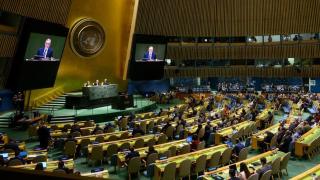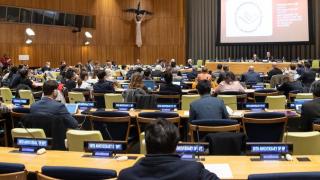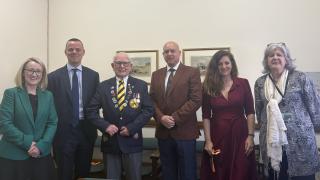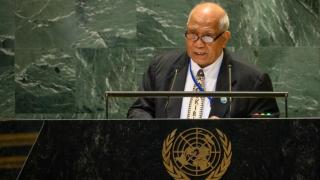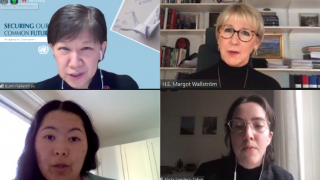
On 16 December 2020, UNA-UK together with UN75 and the Group of Women Leaders hosted an all-women panel on Nuclear disarmament in the UN’s 75th year.
Ahead of the Treaty for the Non-Proliferation of Nuclear Weapons’ (TPNW) entry into force on 22 Jan 2021, experts discussed progress towards disarmament - and set out what still needs to be done to ensure a world free of nuclear weapons. The discussion was moderated by UNA-UK’s Head of Campaigns, Ben Donaldson.
The panel was introduced by Natalie Samarasinghe, who shared lessons learned from the UN’s global consultation. Around the globe respondents - and young people in particular - called for countries to halt the spread of nuclear weapons. Ms. Samarasinghe also stressed the need to amplify marginalised voices on disarmament, particularly women and girls.
"People urged governments to act now to prevent the spread of nuclear weapons. There were also calls to put more attention to the voices of women on this issue."
Sweden’s Former Minister for Foreign Affairs Margot Wallström set out the current situation, with more than 13,400 nuclear weapons worldwide. Wallström noted the development of new destabilising technologies, growing tensions, and the undermining of existing treaties - but said that the TPNW’s ratification marks a new hopeful phase. She highlighted how the Covid-19 pandemic has laid bare the pressing need to redefine the concept of security, with more investment in healthcare and less in nuclear armament.
Reflecting on how civil society, and particularly women, have been key advocates for the elimination of nuclear weapons, Izumi Nakamitsu, UN Under-Secretary-General and High Representative for Disarmament Affairs, argued that the TPNW indicates the extent of frustration at slow progress towards disarmament. She also noted how funds could be used for climate action:
"As we speak, we are entering into probable arms race dynamics. Nuclear weapons states are investing huge amounts of money to advance weapons technology. It has been highlighted that this money could be used elsewhere - like on Climate Change."
The International Campaign to Abolish Nuclear Weapons’ (ICAN) Alicia Sanders-Zakre discussed the groundbreaking nature of the TPNW, which reached 50 ratifications in October 2020. Not only is it the first agreement prohibiting nuclear weapons entirely, it also demands that assistance be provided to the victims of nuclear-weapons use and testing, and recognises the disproportionate impact of nuclear weapons on indigenous communities. She highlighted how negotiations leading to the treaty included those who are frequently marginalised - such as small island states, civil society affected by nuclear weapons, and women diplomats and activists.
Marzhan Nurzhan, of Parliamentarians for Nuclear Non-Proliferation and Disarmament, put a spotlight on the indispensable work of young people. She noted the importance of UN General Assembly Resolution 74/64, which promotes the meaningful and inclusive participation of young people in disarmament and non-proliferation efforts. She underlined the need for intergenerational dialogues, as nuclear weapons are frequently misidentified as a problem of the Cold War era.
The panellists set out key practical steps that can be taken to advance the nuclear disarmament agenda. Izumi Nakamitsu called on Member States to publicly recommit to a world without nuclear weapons, and address risks posed by advancing technologies. She also called for bilateral treaties, such as the US-Russia New START, to be upheld and extended. Margot Wallström noted the need for pressure to be applied on the US and Russia, who possess an overwhelming majority of global nuclear stockpiles. She voiced the hope that the Biden Administration will cancel plans to test nuclear weapons and more closely follow existing agreements.
The panel closed with a Q&A, where Izumi Nakamitsu stressed that public confidence is vital for the success of multilateral agenda - and underlined how the findings of the UN75 consultations reflect widespread support for the UN and international cooperation. Alicia Sanders-Zakre affirmed that any perceived dichotomy between the TPNW and NPT is false, drawing attention to the numerous expressions of support for the NPT during the negotiations that led to the TPNW, and said that legal experts regard the two treaties as complementary. Calling upon nuclear-capable states to affirm the sovereign right of other states to join the TPNW, Sanders-Zakre stressed:
“Having the arrogance to possess these weapons is something that humanity cannot afford.”
- Watch the panel
- Learn more about the work of the UN Office for Disarmament Affairs
- Read UNA-UK’s analysis upon the TPNW’s 50th ratification
- Read Renata Dwan’s call to ensure the active and free engagement of women in disarmament
- Learn about the UN Office for Disarmament Affairs’ Youth 4 Disarmament initiative
- See the recently released handbook for parliamentarians on disarmament
- Read UNA-UK’s recommendations
- Read Together First's Stepping Stones report recommending progress on disarmament
Photo: Izumi Nakamitsu, Margot Wallström, Marzhan Nurzhan and Alicia Sanders-Zakre discuss disarmament at UN75



